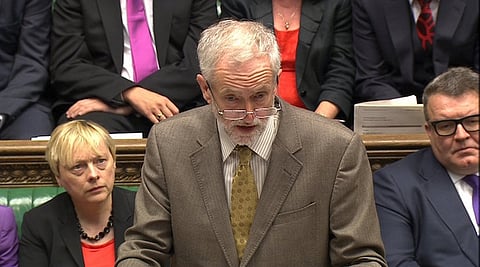Meet new Labour boss Jeremy Corbyn, Malema’s UK brother from another mother
As economic consequences of handing keys to politics's hard left is exposed, those building castles on such defunct ideology have become increasingly desperate. Election of Jeremy Corbyn to lead the UK's official opposition Labour Party is one of the more obvious examples. Corbyn is off to an inauspicious start. He committed a cardinal error when tight lipped during singing of the British National Anthem at the 75th anniversary of the Battle of Britain. The RAF's World War Two invasion-saving victory is universally regarded by Brits as one of the proudest moments in the nation's history. Corbyn followed that with a series of actions showing he – and hard left colleagues – are clearly out of touch with most in their networked, well-informed nation. Ignorance is the greatest ally of vote harvesters who propagate populist but impractical promises. In the UK, Corbyn's idealistic proposals are already making him the butt of jokes rather than stirring the breasts of would-be supporters. An analyst quoted in the AFP story below reckons Labour under Corbyn would be "massacred" by the ruling Conservatives, Something for South Africans to consider when fretting about Julius Malema's EFF, whose policies might have been borrowed from Corbyn's socialist handbook. – Alec Hogg
By Ruth Holmes of Agence France-Presse
Jeremy Corbyn was elected leader of Britain's Labour party little over a week ago on a wave of left-wing euphoria, with a landslide victory of almost 60 percent of the vote.
But as he enters his second week in office, marked by his refusal to sing the national anthem and controversy over his new shadow cabinet, it is clear that the veteran socialist may face a bumpy road ahead.
The anti-austerity advocate was voted in on promises of a fairer society and a new kind of politics, triggering an immediate surge in party membership.
"It's a fantastic moment for change in Britain," he said as he celebrated his election success in a London pub.
His debut has been met with no shortage of hostility, however, even among his own colleagues — reportedly prompting him to admit it had been "an incredibly complicated and busy" few days.
Controversial cabinet
Just over 24 hours after his election the 66-year-old suffered a bitter backlash on social media as he announced his shadow cabinet.
Most contentious was the naming as shadow finance minister of Corbyn's hard-left ally John McDonnell, who called for members of the militant Irish Republican Army (IRA) to be honoured in 2003.
McDonnell apologised for the comment in one of his first media appearances after the appointment last week.
The choice of McDonnell raised eyebrows even within the party, with Labour MP Simon Danczuk saying it meant "the lunatics had taken over the asylum".
The absence of women in top positions also sparked a flurry of condemnation, only slightly appeased by the naming of Angela Eagle as business secretary, another senior position.
In fact the final line-up revealed a 16:15 ratio of women to men, with the left-wing press hailing the first female-majority shadow cabinet in British history.
Corbyn argued that the traditional notion of top jobs was antiquated and that the women-filled positions responsible for education and health were of equal importance.
Queen 'snub'
At his first public engagement, Corbyn ruffled feathers again when he did not join in singing the national anthem, "God Save The Queen", at a service marking the 75th anniversary of the Battle of Britain.
Quizzed by the BBC, the Labour leader said he had been thinking about the role his parents played in the war, and pledged to "take part fully" in future events.
But much of the British press took a disparaging view of the anti-monarchist's tight-lipped stance.
"Corb snubs the Queen", was the next day's headline of Britain's top-selling tabloid, The Sun.
Sadiq Khan, recently named Labour's candidate for London mayor, said Corbyn had been "very unwise".
"You are trying to be the British prime minister: you should be singing the national anthem. It was a mistake, especially on that occasion," he told the Mail on Sunday.
There was a more sympathetic response to Corbyn's first major appearance in the House of Commons, where he attempted to instil a more participatory style of politics.
Moving away from the oft-criticised theatrics of Prime Minister's Questions, Corbyn posed crowd-sourced questions from "Paul", "Mary", "Claire", and others.
But on the question of whether Corbyn himself had prime ministerial potential, senior Liberal Democrat politician Vince Cable gave his opinion in no uncertain terms: the Conservatives would "slaughter" Labour if he fights a general election.
Speaking Sunday at his party's annual conference, Cable said Labour was now "completely unelectable".
The Sunday Times reported signs of disunity in the Labour ranks, saying senior MPs planned to defy pacifist Corbyn and vote with the government in favour of air strikes against Islamic State extremists in Syria.
Corbyn and his key ally McDonnell meanwhile attempted to rally their troops after several party heavyweights announced they would no longer serve in the shadow cabinet under his leadership.
"I would like Chuka to come back desperately," McDonnell told Sunday's Observer, referring to Chuka Umunna, a key party figure who quit the shadow cabinet following Corbyn's election.
"If we could get them back onboard (Umunna and others who left), it will send a message that we really are a big tent."
© 1994-2015 Agence France-Presse

